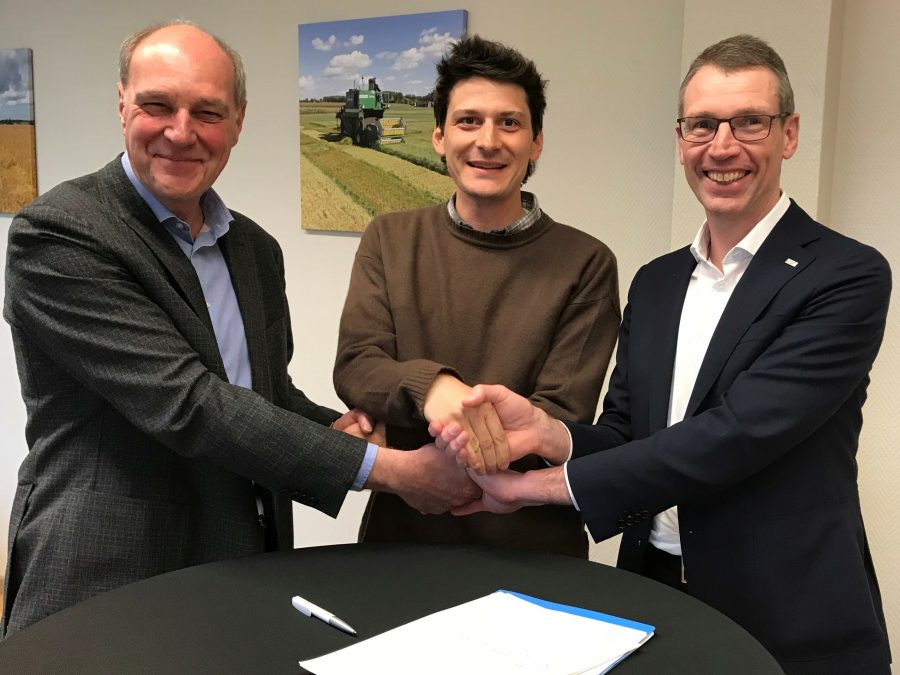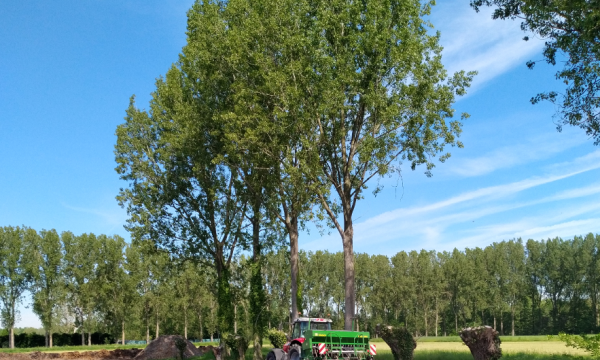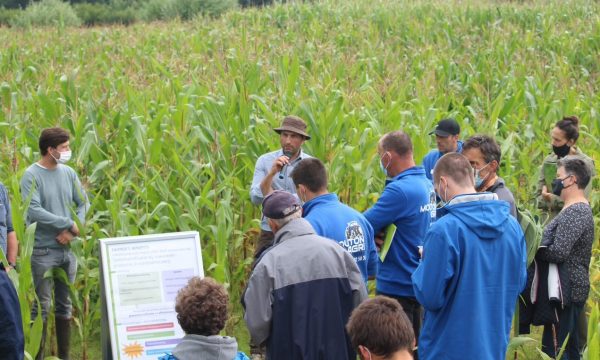Press release First large-scale AGROECOLOGICAL EXPERIMENTAL PLATFORM launched in Flanders

The Hansbeke castle (located in the community of Deinze in Flanders, Belgium) has about 50 hectares of farmland. ILVO (Flanders Research Institute for Agriculture, Fisheries and Food) has concluded a promising cooperation agreement with co-owner and organic farmer Felix de Bousies (PHAE farm) and agricultural consultant and researcher Alain Peeters (RHEA).
The aim is to turn the entire domain into a pilot platform for agroecological research, parallel to the normal operations as an organic farm. The theoretical principles of agroecology are put into daily practice, and through experiments, field trials, innovative techniques and intensive scientific monitoring, the researchers quickly gain insight into the best systems and practices.
These are then shared throughout the agricultural sector.
Definition of agroecology
The term agroecology is often used in social thinking exercises to outline a future ideal of fully sustainable agricultural production. Agroecology is neither a uniform agricultural system, nor a set of specifications in which one acquires an agroecological stamp or not. “Rather, it is about taking steps in an improvement continuum. It is about looking at the context in which each farm can move along the well-defined ‘ambitions’.”
These are ambitions or principles of agroecology:
- striving for improved soil health,
- closing nutrient cycles,
- more biodiversity, including functional biodiversity for farm management
- reduction of external inputs,
- a closer relationship between producer and consumer,
- autonomy and resilience in the business plan,
- co-creative and systemic knowledge building where researchers and farmers work together.
An OPEN pilot platform, instructive for many target groups
The Experimental Platform for Agroecology in Hansbeke generates expertise for several types of professionals: primarily farmers, but also agricultural consultants, agricultural contractors, machine builders, technology companies, and companies active in crop protection and breeding.
Arable and livestock farmers are particularly interested in the given crop rotations, but the system of crop rotation can also arouse the interest of tree nurseries, especially when they work together with arable and livestock farmers.
Interested farmers are not explicitly limited to organic growers. Many conventional farmers are also showing a growing interest in achieving the above ambitions, which are in line with the 'Farm to Fork' strategy proposed by Europe.
Advisers, policy makers, agricultural scientists and ecologists at home and abroad can also follow the experiments. The partners of the Agro-Environmental Trial Platform are committed to make the accumulated know-how as transparent as possible, as soon as possible.
DNA of the initiators: ILVO, PHAE, RHEA
The organic farm of Felix de Bousies is called PHAE (acronym for 'Project Hansbeke AgroEcology'). PHAE is Greek for 'eat' and 'shine'. The farmlands are part of the Hansbeke castle grounds. Since 2017, de Bousies has been farming the land himself. Since then, many small landscape elements and woody plot edges have been created. The company aims to put a quarter of the area into permanent grassland and the rest in arable crop rotation. Ponds have been constructed to balance the water balance and maize as monoculture has been abandoned. Projects with agro-forestry were started. Felix de Bousies: "I have been reading up for years about the agro-ecological approach. Our project has the ambition to be both sustainable and profitable. As a young farmer, I will be able to learn a lot from the field trials and the experts who will be active in Hansbeke. This learning curve will be accessible to all those interested in our field".
I have been reading up for years about the agro-ecological approach. Our project has the ambition to be both sustainable and profitable.
RHEA (Natural Resources Human Environment & Agronomy)
is an autonomous Belgian research agency specialized in agronomy, biodiversity, rural development and ecosystem management. Founder is Alain Peeters, until 2007 agronomist at the Université de Louvain in Louvain-la-Neuve. Peeters specialized in grassland and production systems in temperate and tropical regions (with experience in North and Sub-Saharan Africa, Central Asia and Eastern Europe). He helped translate the EU legislation on agri-environmental measures, the Nitrates Directive and the Natura 2000 program into the Walloon regulations.
RHEA works with a multidisciplinary network of recognized professionals and has links with several universities, research centers and other consultancies. We have expertise in working with experimental farms and guiding a whole-farm transformation approach (holistic and participatory approach). In Hansbeke, the basic formula of agro-ecological knowledge building is important: farmer and researcher together, with their feet on the ground. This guarantees validation of our theoretical insights'.
ILVO (Flanders Research Institute for Agriculture, Fisheries and Food)
is the largest of the 5 Flemish Scientific Institutions, with sites in Melle, Merelbeke and Ostend. Researchers and technicians provide applied knowledge for plant and animal primary producers, fishing and the marine environment, food and bioeconomy…in short, the entire agri-food chain. Agricultural crops and soils, ornamentals, genetics, spraying technology, agro-automation, livestock and feed, animal welfare, nutrition and food safety, sea fishing, ... are some of the areas of expertise of ILVO. ILVO has more than 300 researchers, laboratories, 200 ha of field trials, experimental animal housing for for dairy cattle, pigs and poultry, an pilot food processing plant called the Food Pilot (together with Flanders' FOOD), test benches, pilot installations, a seed processing unit, etc. The mission of the approximately 600 employees is to work on a sustainable agri-food chain and sea fishery in all respects.
Approach of the Experimental Platform
The initiators put their wish lists together every summer and decide by mutual agreement which research program will be carried out on which plots in the coming year.
ILVO tries to frame the research largely in European and nationally funded research projects.
For PHAE it is important that the knowledge build-up is also in function of the progress the farmers wish to make in terms of soil quality, crop performance, diversification and product valorization. The scientific experiments and monitoring should not interfere with business operations and strategy.
RHEA offers research opportunities that fit in with the business context and that address knowledge gaps for the further application of agro-ecological principles to make agriculture more sustainable.
The three initiators celebrate an open culture. The cooperation network can be expanded on an ad hoc case-by-case basis. Koen Willekens (ILVO): 'Research is being done within a living lab formula: several stakeholders and researchers may be involved. Connection with the network of existing living labs active in the agri-food sector is therefore logical.
An agreement on the first major lines of research
1. Soil quality: How much carbon do we get captured in the soil? How can we remediate or prevent (harmful) soil compaction?
Both objectives require a strict application of alternative soil management strategies over a longer period of time and good measurement methods to monitor progress. Both remediation of soil compaction and building up the carbon stock in the soil are a several year process.
The Flemish government finances the research on both subjects: through the C-monitoring network program (Department of the Environment) and through the VLAIO project ‘LA - soil compaction’.
2. Producing farm compost through a new collaboration concept.
Field compost is an important tool to improve the general soil quality and reduce the need for externally supplied fertilizers. Moreover, when composted with local residual flows, nutrients and organic matter are recirculated sustainably.
In the fertilization regulations (MAP6), the Flemish government (VLM) has broadened the definition of farm compost. Farmers no longer need to have all green and woody materials available on-farm farm to create a correct mix in the compost heap.
VLM: 'A farmer can now work together with up to two other farms or organizations for composting. This can be either with nature managers or farmers. The nature manager who offers material for farm composting must apply for a farmer's number from the Department of Agriculture and Fisheries. The compost may be used on the parcels of the farm where composting takes place and on the parcels of one or two farms with which the farmer cooperates for composting. The Flemish Government may lay down further rules and impose additional conditions for the use of farm compost'.
Koen Willekens (ILVO): 'The compost heap present at PHAE is unique in Flanders. For the first time, the broadened definition of farm composting is being put into practice. A nature conservation agency (ANB) will supply the clippings, while plant residues and animal manure come from farms. The new formula is being evaluated and substantiated here. We are also making the connection with the European project Soilcom (Interreg Vlaanderen-Nederland Border Region) around strategies to promote compost on many more fields'.
3. A no-till system that respects the natural stratification of the soil.
The classical plowing of the topsoil, before sowing in 'clean' soil, is no longer used in the Agroecologisch Proefplatform. Together with contractors and equipment builders, the three partners use alternative (sometimes less well-known) equipment to prepare the soil for subsequent cultivation. After using of each of these machines, the performance of the following crops and the weed pressure are closely tracked.
The following pieces of farm equipment for the very superficial mechanical destruction of a short-cut sod of temporary grassland will be demonstrated during the first open meeting of the Agro-Environmental Trial Platform (30 July 2020):
- mulcher: cuts turf very superficially
- eco-plow: very shallow (< 10 cm) plow to make crop residues disappear from the surface.
- Precision cultivator: peels off the top layer of the soil, causing turf to die off.
- Disc plow: cuts the turf and shakes the bottom of the root balls
- milling cutter: chops the turf and then mixes it lightly with the top layer.
- Compost turner with humidification module: specific device used to convert the heap for aeration, temperature control and humidification, so that the process runs optimally within a period of about 3 months.
- Overseeder: in a soil with crop residues or even in a standing crop, the cutting discs prepare 'gullies' in which the seed is immediately placed at the desired depth. Several seed sizes (of different plant species) are deposited at the same time and each at an optimal depth when the farmer wants to install a so-called mixed crop (2 or more crops at the same time in the same field).
4. Mixed crops, crop rotation, protein-rich and atypical crops
The following crops and mixed crops are already present in plots:
- microclover (very small ground-cover clover) in which a main crop such as grain is sown.
- A combination of grass and clover, not sown with English ryegrass but rather with cocksfoot grass, because it has more intense roots and is more drought resistant.
As part of the LA GrasKlim research project, ILVO is constructing a comparative demo plot with 3 mixtures, where red clover is sown with with reed fescue, cocksfoot and English ryegrass, respectively. - buckwheat (application for the bakery sector)
- multiple cereal-legume combinations (e.g. field bean or forage pea with triticale) as roughage or concentrates for ruminants
- The VLAIO project LA follow-up project Agroforestry studies the potential for (very) late-ripening walnut varieties.
Organic grower Felix de Bousies, with his sandy soil, does not immediately opt for vegetable cultivation, not even for the classic maize. He does, however, opt for main crops that can be processed into food (cereals and pseudo-grain such as buckwheat) or can be used as roughage or concentrates (grass-clover, cereals, legumes) in animal husbandry.
Ambitions in the slightly longer term, some of the possibilities
- The Horizon2020 project Agromix focuses on increasing diversity on farms by integrating crop and animal production, including the 'tree component'. Among other things, the researchers will assess nutrient and organic matter flows in the context of exchanges between an arable farm and a livestock farm. PHAE will become a possible case here.
- A component of outdoor poultry farming (laying hens) will be considered. The research monitors the do's and don'ts of such a transition: technically, commercially and in terms of marketing.
- ILVO organizes the connection of PHAE to its DACOM field registration system and ILVO's big soil data system. How do the agro-ecologically managed fields score under applied cultivation practices and climate conditions on the different indicators?
- How can an analysis of RGB and multi-spectral drone images contribute to determine the botanical composition and dynamics of mixed cultures, and to interpret crop development and health? ILVO uses this research question in the H2020 research project Future Arctic (automated assessment of species composition).
- The effect of so-called ‘compost tea’ as a liquid seed coating and as a nutrient for growing plants. PHAE and RHEA will start exploratory experiments in 2020. ILVO can use drones to compare plant height and plant health on multiple fields via 3D.
- Soil compaction: to what extent is soil management on PHAE effective in preventing soil pollution?
- And/or remedy soil compaction? ILVO can carry out measurements within the framework of the Flemish VLAIO-LA research project soil compaction.
- Carbon build-up in the soil: within the framework of ILVO's C-monitoring program, certain plots can be monitored in Hansbeke.
Decision: acceleration, applied and applicable research
The list of concrete first trials and concrete plans for the Agroecologisch Proefplatform is so large that people are saying it’s off to a flying start. ILVO promises in its new strategy to accelerate knowledge development for healthy primary production (and catch), healthy food processing, healthy socio-economic relations, healthy consumption patterns and a healthy environment, all through cleverly integrated, multidisciplinary and co-creative research. It is inevitable that this pilot platform will become a very important asset in this acceleration.
Thanks to:
- Man@Machine ~ suppliers of innovative farm and food machinery
- Ecoploeg NKG | Koeckhoven.net
- PCG Kruishoutem: PCG Kruishoutem (pcgroenteteelt.be)
- Machines de compostage – Menart
- Company Steeno NV/SA - Vichte (disc plow)


